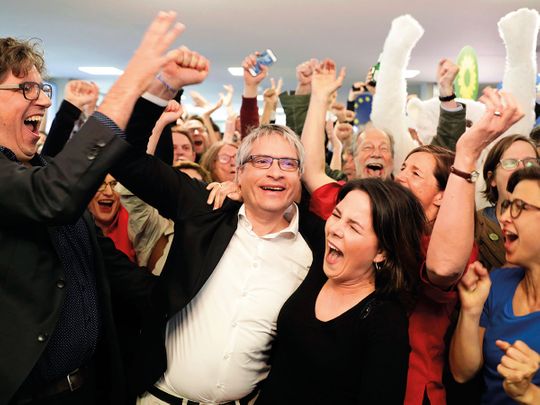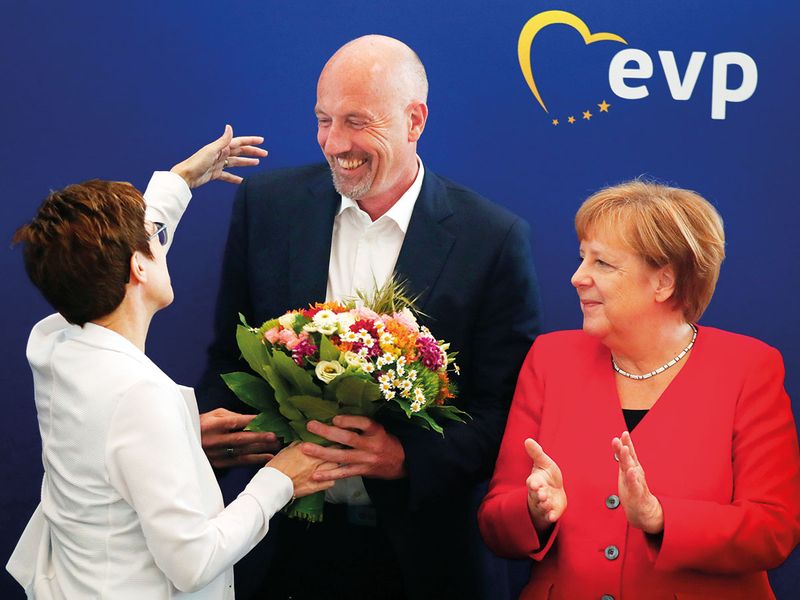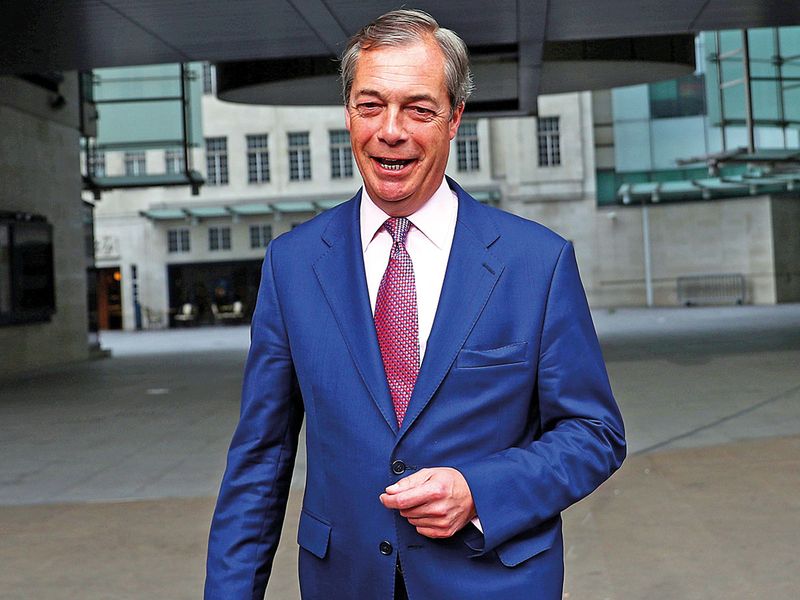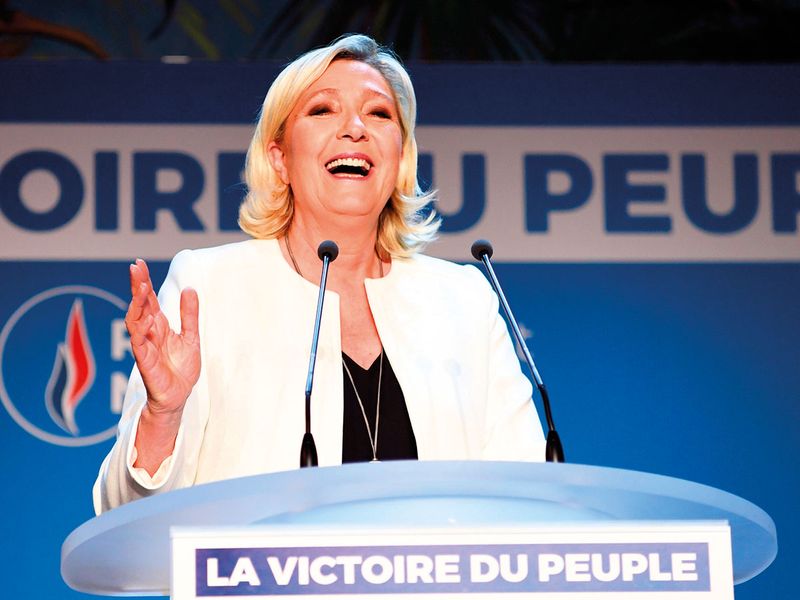
Brussels: Europeans delivered a hammer-blow on Sunday to their continent’s establishment politicians, propelling alternative parties on the both the left and the right in elections for the European Parliament, according to initial results and exit polls, after a tumultuous period for the 28-nation border-erasing European Union.
Citizens turned out in droves — the highest participation in 25 years — for a chance to take a shot at the traditional centre-left and centre-right parties that have driven Europe’s consensus-driven policies for decades. But although far-right leaders were on track for their best Europe-wide result ever, an anti-immigration wave did not appear to be as forceful as opinion polls had predicted, and Greens and other pro-EU leftists also posted strong gains.
In the five years since Europeans last voted for the European Parliament, the continent has been rocked by repeated terrorist attacks, a refugee crisis, Britain’s decision to split from the bloc and the lingering pain of the global financial crisis. Now, the anti-establishment raiders will have a better foothold to try to transform the European Union from the inside out.

From the Italian leaders who want to erect new barriers against migrants to Hungarians and Poles who question core European tenets about the independence of the judiciary, the newly energised far-right is expected to expand its power within the European legislature, even though pro-EU forces were on track to remain a strong majority.
Based on the first exit polls released on Sunday after voting started to wind down, German citizens delivered a boost to the Greens, and the Euro-sceptic Alternative for Germany (AfD) party had a disappointing result, coming in below its 2017 result in national elections.
In Austria, the far-right party sank after a last-minute scandal torpedoed its leader, but its coalition partner, the centre-right party of Chancellor Sebastian Kurz remained unscathed.
And in France, the far-right National Rally party was leading exit polls, a blow to President Emmanuel Macron, who had made the vote a plebiscite on his own rule.
Whoever wants legitimacy from us and the legitimacy of the many who went onto the streets will need to deliver now.
With more than 400 million eligible voters, the European Parliament election is the second-largest exercise of democracy in the world, after India’s.
Citizens used their chance to batter the establishment parties that have dominated European politics since the Second World War.
The European Union is a political and economic project born from the ashes of conflict that for decades has helped people and products move easily from Portugal right up to the border with Russia. But economic uncertainty has helped sweep away the old consensus about its utility. While strong majorities in places like Ireland and the Baltics continue to support it, more and more, countries are also souring on its values. They see less to gain in opening their doors to outsiders and feel their nations are served better by throwing up new barriers.
The churn started before President Donald Trump stormed the White House in November 2016 as an outsider candidate, but it comes from some of the same root causes. Trump and his allies have reached out to ideological allies in Europe. This month, Hungarian Prime Minister Viktor Orban paid a visit to the Oval Office. Although Orban has swept away democratic protections at home, Trump offered nothing but praise.
The Kremlin is also watching the results with interest, since many of the far-right parties favour closer ties to Russia and want to sweep away sanctions imposed after the 2014 annexation of Crimea.

A new Europe is born. I am proud that the League is participating in this new European renaissance.
The end result is likely to be a European Parliament in which the centrist parties fail to reach a majority for the first time and have to draw support from lawmakers with less orthodox views of how to run Europe. Projections released before voting started Thursday showed the centrists falling from 53 per cent of the vote, to only 42.
The legislature has a voice in some of the biggest issues facing the European Union. It approves senior EU officials, signs off on Europe’s massive budget and delves into gritty lawmaking, such as the sweeping data privacy rules that went into effect last year whose reach extends far beyond EU borders.
But it has also long been a haven for far-right forces. In 2014, they captured about one-fifth of the seats. Now they are poised to control a quarter, according to polls released before the voting started. They can use their seats to project power that is outsize to their sheer numbers by slowing and obstructing the functioning of the legislature, even though they will not be able to control its agenda.
For years, voters paid the European Parliament little attention. Election day turnout has slipped steadily since the first election in 1979, to 42.6 per cent in 2014 — a sluggish result by European standards, where a higher percentage of voters typically participate in national elections than in the United States. The low turnouts favoured the extremes, who were better able to marshal their passionate supporters to the polls.
But on Sunday, turnout was estimated to be 51 per cent.
And in Germany, the EU’s most populous nation and powerhouse of the continent’s economy, turnout was even higher: Nearly 60 per cent of Germans voted on Sunday, compared to fewer than half in 2014.
But the electorate fragmented among smaller parties, with the two governing parties that have traditionally dominated the country’s politics appearing to continue their downward slide.

Chancellor Angela Merkel’s centre-right Christian Democrats were comfortably ahead in forecasts released by broadcasters after polls closed. But the party appeared to have fallen around seven percentage points from the last vote, in 2014.
Party chief Annegret Kramp-Karrenbauer told supporters in a Sunday night speech that the results fell short of expectations. But she predicted the centre-right would emerge on top continentwide.
Losses were far heavier for Merkel’s long-suffering coalition partner, the centre-left Social Democrats, who appeared to have fallen to third place.
The Social Democrats’ losses were compounded by apparent defeat in state elections in Bremen, where they have governed for over seven decades. The results add to a string of devastating election nights for Germany’s oldest party, and will likely increase the pressure on party leaders to ditch the unloved coalition with Merkel.
At a grim election-night gathering, the party’s leader, Andrea Nahles, called the results “extremely disappointing” but signalled they would stick with the government — at least for now.

The Greens, meanwhile, surged into second place, according to the forecasts, reflecting both dissatisfaction with the governing parties and an increased focus in Germany on climate change.
Party co-leader Robert Habeck told broadcaster ARD that concern for the planet’s future had “played a dominant role” in the German campaign, and that voters were punishing the government for its “hesitancy” in confronting the issue.
The vote appeared to have been a disappointment for Germany’s far-right Alternative for Germany party. Forecasts showed it taking just over 10 per cent of the vote — well ahead of its performance in the 2014 European election, but below the nearly 13 per cent the party took in the last national election, in 2017.
In the EU’s other German-speaking nation, Austria, early forecasts showed the country’s main far-right party losing ground in the aftermath of a scandal that brought the government crashing down last weekend.
A forecast by national broadcaster ORF placed the Freedom Party in a distant third place, well below what polls had suggested the party would win before the controversy broke.
Austria’s government collapsed last weekend after a video emerged of the Freedom Party’s leader, Heinz-Christian Strache, appearing to dangle the promise of government contracts to a mysterious Russian woman in exchange for favourable coverage in news outlets she said she intended to buy.
Chancellor Sebastian Kurz, who chose to govern with the Freedom Party following 2017 elections, appeared to have suffered no ill electoral effects from the scandal: The forecast showed his centre-right People’s Party with a commanding lead.

In France, the far-right party won the largest share of the vote, approximately 23 per cent, according to early exit polls. France’s centrist ruling party, La Rpublique en Marche, won just slightly less, coming in at 22 per cent. As in Germany, France’s Green Party also performed strongly, winning roughly 12.5 per cent — and besting the country’s traditional centre-left and centre-right parties in the process.
Voter participation was also at a record high, with roughly 52 per cent participating, according to the French Interior Ministry.
France was perhaps the most widely watched national contest, and the results were seen as a public referendum on the leadership of Macron, who came into power in 2017 with an avowedly pro-European agenda.
But Macron’s popularity has plummeted since his election, notably in the form of the ongoing “yellow vest” protest that portrays the young president as out-of-touch with the concerns of ordinary people.
“The erasure of the old parties ... confirms the new divide between nationalism and globalisation,” Le Pen said Sunday, clearly delighted at the results.

For French voters, the 2019 elections became a replay of the 2017 presidential election, with Macron squaring off once again against Le Pen. She has since adapted her Euroscepticism to be more palatable to an electorate distrustful of Brussels bureaucracy but horrified by the chaotic aftermath of the Brexit vote, saying she wants to change the European Union from within rather than leaving it.
As elsewhere in Europe, the European parliamentary elections have long been seen as protest votes in France, and her success in the venue was hardly new. The party also topped the 2014 elections, taking 25 per cent of the vote — a better score than it was projected to earn on Sunday.
The result was unlikely to have a direct effect on Macron’s ability to govern France, since he dominates the French parliament, but it was a symbolic blow to his standing in Europe and his efforts to reform the bloc.
In Italy, the Western European country that has most clearly thrown its support behind populism and the far right, the results will help determine whether Salvini can continue his rise as a nationalist torchbearer inside the bloc. Salvini has tried to build a new pan-European far-right coalition, but it is Salvini’s own party, the League, that figures to account for a disproportionate percentage of the far-right’s gains across the continent.
The outcome will also have domestic implications in Italy, where for months the League has been sparring with its coalition partner, the Five Star Movement. A strong showing by Salvini could convince him to pull out of the coalition and use new elections as a bid to become prime minister.
Since forming the government one year ago, the League has risen to become Italy’s most popular party. Opponents have depicted Salvini as an absentee minister — perpetually holding rallies, rarely in the office — and recent polls suggest his party has lost some momentum. Still, projections indicate the League will win about one-third of Italy’s parliamentary seats, more than the Five Star Movement or other once-mainstream parties now relegated to the background.
Britain is also taking part in the election, despite its vow to pull from the European Union following a 2016 referendum. Prime Minister Theresa May failed to make Brexit arrangements that would have ended the membership before the election, so her country had to participate. Euro-sceptic leader Nigel Farage is poised to repeat his 2014 poll-topping performance in the hard-fought campaign.
— The Washington Post








